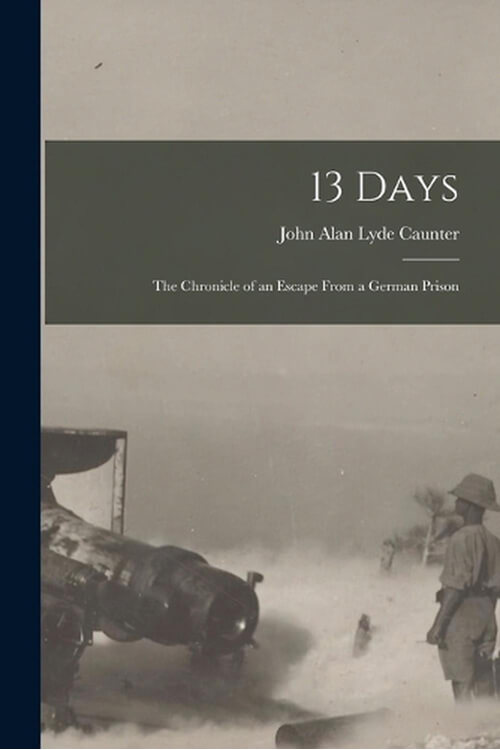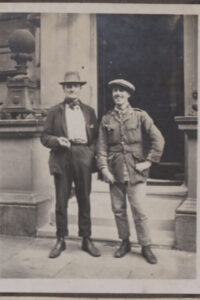
13 Days The Chronicle of an Escape from a German Prison
The Germans I talked to were thoroughly fed up with the war and only wanted peace. This does not mean that they will break out into Revolution. That to my mind cannot come about until the military defeat of Germany is a fact. The Kaiser, not too popular nowadays, would immediately regain his former position in the minds of his subjects could he but secure a peace even partially favorable to the German people? The rulers of Germany know that defeat, or anything like it, would be fatal for them; that is why they will stick at nothing and spare no spilling of blood until they have either won or lost irretrievably. What would a patched-up peace mean? It would mean that Germany would begin building submarines by the hundred for use against us within ten years. It would mean just an armistice for a few years and then a renewal of the conflict without Russia and probably many of our other exhausted allies.
The Germans with whom I spoke knew this and looked at the future with open eyes.
I wonder if it is realized how much the British are hated by the Germans. Their hate of us is “Kolossal,” to use their expressive word. Somebody in Germany said that should the Germans ever get into England they would make “Belgium appear like a Garden of Eden in comparison with what England would look like after they had done with her.”
It is a German boast that the war has never touched the sacred soil of the Fatherland. The few occasions on which our airplanes bombed German towns during my stay there, gave me an excellent opportunity of judging how sensitive they are to this particular form of punishment. The bombing of Karlsruhe and Freiburg caused a scream throughout the west of Germany. I heard the echo of it in the canteen at Crefeld.
When I suggested that London had also been bombed and innocent lives lost, they simply said that that was different. Thus in their minds, there are two kinds of law, one for England, and the other for Germany. I was very pleased to notice how much less the effect of air raids on our civilian population than on the Germans. There is no doubt that the fear of air bombardments is much stronger in Germany than over here.
There is only one way of touching the German mind and that is by the employment of FORCE, Brute Force. It is what he believes in as the medicine for his enemies, simply because he judges others by himself, and knows that he respects that and that only, and therefore applies it whenever possible to others.
It is a pity that our public does not know more about the German mentality. It is knowledge of this factor that should assist one in having a correct view of things and in understanding German aspirations and methods.
Read or download Book
John Alan Lyde Caunter
Brigadier John Alan Lyde Caunter CBE, MC & Bar (17 December 1889 – 20 April 1981) was a senior British Army officer and a pioneer shark angler off the British coast. He published an account of his escape from Germany as a prisoner of war in World War I.
Military career
John Alan Lyde Caunter was born in Banwell, Somerset to Richard Lawrence Caunter, a medical practitioner from Liskeard, Cornwall, and Johanna Wilhelmina Koerber of Leith, Scotland. The family on the father’s side were descended from the Caunters of Ashburton, Devon, whose history was detailed by John’s cousin Frederick Lyde Caunter. John’s middle names go back to the Reverend John Alan Lyde, whose daughter Marian Lyde married the woolen manufacturer Richard Caunter in Ashburton in 1826. Educated at Uppingham School and the Royal Military College, Sandhurst, John was commissioned into the Gloucestershire Regiment in 1909.
John Caunter was captured by German forces in October 1914. He spent most of the war in German captivity before escaping from a camp at Schwarmstedt in the summer of 1917. He managed to cross into the neutral Netherlands and reached England still wearing his POW clothes. The following year he published 13 Days: The Chronicle of an Escape from a German Prison. While John was in captivity his younger brother Richard, a second lieutenant in the Gloucestershire Regiment, was killed in action in Mesopotamia at the end of 1916.
Caunter went on to serve with the British Salonika Army in 1918. On 13 February 1920, he married Helen Margaret Napier Napier in Churt, Surrey, where both lived at the time. A daughter, Pamela Margaret Napier, was born in 1921, and a son, John Richard Lyde, in 1924, both Farnham, Surrey. Caunter became commanding officer of the 1st Battalion, Royal Tank Corps in Egypt in 1935 and became commander of the 4th Armoured Brigade in the Western Desert campaign in January 1940, in which role he saw action at the Battle of Beda Fomm in Libya in February 1941. He became Deputy Director of Staff Duties, and Armoured Troops at GHQ India in 1941 before retiring in 1944.
His wife having died suddenly in New Delhi in 1942, Caunter married Muriel Lilian Murphy, born Hicks, in Liskeard in 1945.






